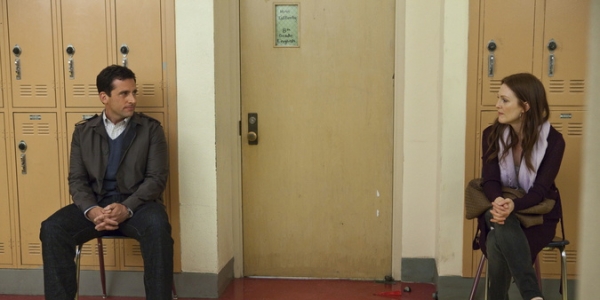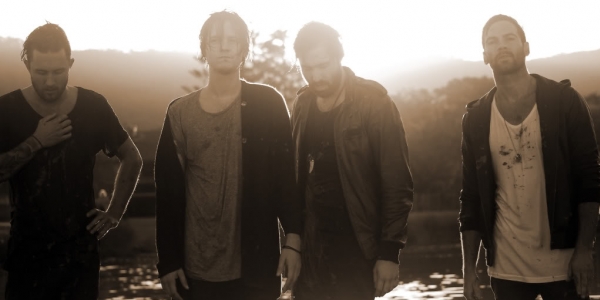“Crazy, Stupid Love in many ways reflects our world view in that life can be brutal and it delivers some really hard blows but love and humour will get you through it and ultimately it’s worth it. We just think it’s realistic, and it’s a way to do realistic without being heavy. Our humour makes you laugh, and it makes you laugh because maybe it’s just a bit too true.”
Crazy, Stupid, Love stars Steve Carell (from the US version of The Office, etc), who plays businessman Cal Weaver, who learns over dinner that Emily (Julianne Moore), his wife of 28 years, wants a divorce. She has been having an affair with a colleague (played by Kevin Bacon). Cal’s life falls apart. He spends several nights in a local bar drowning his sorrows, until handsome Lothario Jacob (a seriously buffed Ryan Gosling) takes pity on him. Jacob gives him a makeover and teaches him how to pick up women. Meanwhile, Jacob also falls for feisty, newly minted lawyer Hannah (Emma Stone). And Cal’s teenage son Robbie (Jonah Bobo) is obsessed with his teenaged babysitter Jessica, who has a crush on Cal.
The film is really heartfelt, and draws upon some painful and personal elements drawn from writer Dan Fogelman’s own life. “I think he really does write from his heart,” says Ficarra. Fogelman sent the script to Carell’s production company, and he was immediately attracted to it. He brought Ficarra and Requa on board as directors, even though the pair were not really known for this sort of film, and had only directed one film, the controversial and offbeat romantic comedy I Love You, Phillip Morris.
Ficarra and Requa first met 24 years ago as students at New York’s Pratt Institute where they were both film students. They hit it off and have been working together ever since. The pair is probably best known for writing the anarchic black comedy Bad Santa, which they originally wrote for James Gandolfini. “But it turns out he was unavailable,” explains Ficarra. “Once Billy Bob Thornton got interested we offered to do a rewrite for him but he said: ‘Nope, it’s fine.’ So it was actually written for this gruff New Yorker, but Billy Bob put his little Arkansas twang to it, and it all worked out. He did a great job.”
Crazy, Stupid, Love boasts an extraordinary ensemble cast. Ficarra, Requa and Carell created their own dream list of who they wanted for the film. “And everybody said yes,” says Requa. “It was such a thrill that they were willing to do it. I mean, you have your wish list of big actors for little parts, but it very rarely comes to pass, but I think it speaks to how good the script was. The only one who was a surprise was Ryan Gosling because we didn’t think he would be interested. We didn’t think of him as a comedy guy.” At the recommendation of a friend who was also the head of the studio they met with Ryan. After about five minutes they were convinced he was right for the role. “He’s funny and charming, and so much different from all of those movies. So it was all effortless really.”
The most difficult role to cast was that of Robbie, Cal’s 13-year-old son. The pair looked at thousands of working 13-year-old actors in America and Canada. Bobo had sent in a video or tape of himself doing the lines that he did at home. He was just very natural, not putting any false emotions behind the words. He wasn’t trying to act, which impressed Requa and Ficarra.
“When we saw that audition we said that’s really great! And when we hired him we said to his mother: ‘Don’t let him rehearse! Just have him learn the lines flat, without any inflection or don’t talk about the emotion of the character. Just have him sit and learn the lines, and we’ll work with it on stage.’ And that’s what worked for us. People keep telling a kid how to act when they really have an innate gift. And he had an innate gift, and you just have to let that gift come through instead of it being clouded by other voices.
“And for us it was just a matter of hoping he didn’t grow up too fast,” adds Ficarra, “because you’re at a precarious time. He could grow up on screen within the course of a couple of months. A month after we wrapped he shot up six inches and his voice changed. He dropped twenty pounds.”
Ficarra and Requa didn’t really do any rehearsals with the actors on set. They would talk about the characters, do a light rehearsal and walk through the scene. Their aim was to try and keep it as fresh as possible, with some slight variations.
“Usually in the smaller parts people will audition, so you get a glimpse of what they are going to do,” adds Requa. “Like the babysitter, her performance was in her audition so we knew that she knew the character. We rehearse prior to shooting a take. We’re incredibly open. There’s no such thing as a bad idea. It’s better to just do it than talk about it really. We’re dealing with such talented people that it was a pleasure. We learned as much from them I think.”
When asked about their working methodology, Requa explains: “We finish each other’s sentences, and we’re like minded. We’ve got to the point now where we don’t know where our talents begin and end. We write using one computer and two monitors facing each other, and we direct similarly. We do a lot of prep before the movie starts to make sure we’re on the same page on all the issues, so that the actors aren’t confused or that we’re giving mixed messages to the crew and so on. But generally speaking, we rarely disagree. And when we do disagree we generally know which person who is more passionate and the other will back down.”







